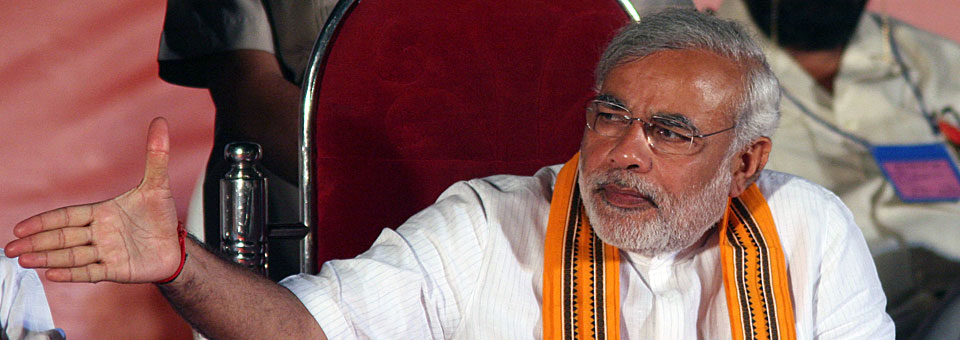Newly elected Indian Prime Minister Narendra Modi has begun to stamp his authority and the mark of the ruling Bharatiya Janata Party (BJP) on the sub-continent, most prominently with an order for official Government communications on social media to be made in the Hindi language. The announcement has garnered headlines across the World and has been taken as a sign of what is to come in India’s immediate future – a move towards increased Hindu nationalism. Amidst the well-deserved criticism and furore, is there some heart we can take at least in the fact that this is all happening so openly?
On 27 May, the Indian Home Ministry’s Department of Official Languages issued a circular asking all Ministries, Departments, public offices and banks to primarily use Hindi when communicating on social media accounts. The directive, signed and authored by Director of the Department Avadesh Kumar Mishra stated that, “…all officers and employees who operate official accounts on Twitter, Facebook, Blogs, Google, Youtube should use Hindi and English languages. Prominence should be given to Hindi“. It has since been argued that the circular is merely a re-issued directive from March of this year and is not a move made by the Modi Government. Further still, the Union Minister of the State for Home Affairs, Kiren Rijiju, tried to quell the tide of criticism that the Government has received over the last few weeks by claiming that the Directive only applied to Hindi-speaking States and was not being enforced upon areas where Hindi was a secondary language.
This back-tracking however flies in the face of a further circular which announced that Government employees who complete most of their work in Hindi will compete to receive prize money, with 2000 rupees being awarded to the leading candidate, and 2nd and 3rd monetary prizes being made available too. In addition, Narendra Modi himself has exemplified the prominence that is now being given to Hindi by speaking not in English (which although being seen as the language of a British-Imperialist past is at least understood nationwide) but in Hindi at his first meeting with heads of States belonging to the South Asian Association for Regional Cooperation (SAARC). This was an act to impress upon his neighbouring counterparts of the direction that India is taking and can be similarly seen in his all-Hindi address made to the Parliament of Bhutan a week ago.
There is a certain admiration that one must have for the new Prime Minister. He is in my opinion acting in accord with a calculated and strategic design to implement the India that nationalists have been yearning for since the dictatorship years of three decades ago and before. It is the promotion of a unitary State defined by Hindustan, Hindi, and Hindu. The admiration comes not for such blinkered ideals, but the manner in which they are being espoused so openly and without fear. As Karunanidhi, the leader of the Tamil political party Dravida Munnetra Kazhagam (DMK) was quick to opine, “No one can deny it’s a beginning to impose Hindi against one’s wish. This amounts to an attempt to treat non-Hindi speakers as second class citizens“. For decades, India has experimented with building a singular State, ruthlessly curbing regional identities and the rights of indigenous people; perhaps under Modi we will now see this battle being fought openly above ground?
Whether one supports or opposes Modi and this BJP Government in India, their desire to put first the ideals which they stand for, to press ahead with policies and actions that seek to create the India they want to see, are refreshing in South Asia – if little else. His Sikh political peers from Punjab for example have never shirked from compromising the ideals of their party, themselves and indeed of those whose way of life they purport to represent, if it means maintaining powerful positions and all of the trappings that come with that. In fact it is with great shame that we can scarcely think of many Sikh or Punjabi politicians who have retained even an ounce of integrity when finding their way into the Lok Sabha. Modi is doing right by ‘his’ people and as despicable, detrimental and downright dangerous as that is for the people of India, perhaps the entire World, at least we’re able to see it happening in the cold light of day. Whether such an overtly fundamentalist direction will be countered though is a different question.





